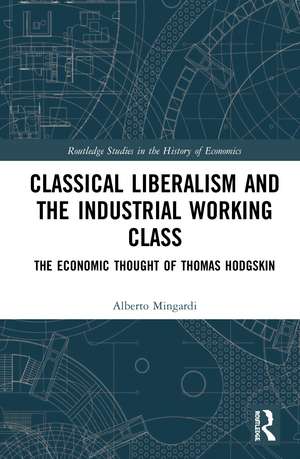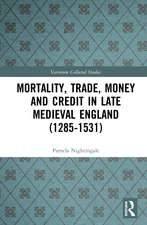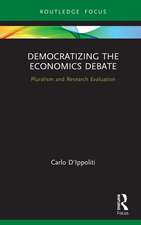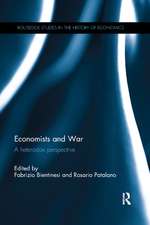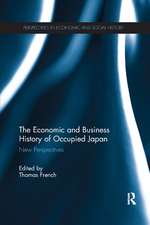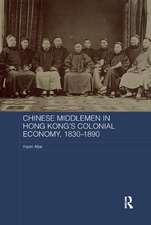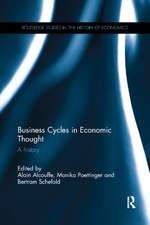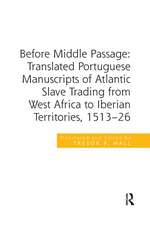Classical Liberalism and the Industrial Working Class: The Economic Thought of Thomas Hodgskin: Routledge Studies in the History of Economics
Autor Alberto Mingardien Limba Engleză Hardback – 21 iul 2020
Classical Liberalism and the Industrial Working Class: The Economic Thought of Thomas Hodgskin will be of interest to advanced students and scholars in the history of economic thought, economic history and the history of political thought.
| Toate formatele și edițiile | Preț | Express |
|---|---|---|
| Paperback (1) | 316.51 lei 3-5 săpt. | +13.79 lei 6-10 zile |
| Taylor & Francis – 29 apr 2022 | 316.51 lei 3-5 săpt. | +13.79 lei 6-10 zile |
| Hardback (1) | 997.58 lei 6-8 săpt. | |
| Taylor & Francis – 21 iul 2020 | 997.58 lei 6-8 săpt. |
Din seria Routledge Studies in the History of Economics
-
 Preț: 378.26 lei
Preț: 378.26 lei -
 Preț: 316.51 lei
Preț: 316.51 lei -
 Preț: 302.55 lei
Preț: 302.55 lei - 9%
 Preț: 1003.12 lei
Preț: 1003.12 lei -
 Preț: 324.46 lei
Preț: 324.46 lei -
 Preț: 311.28 lei
Preț: 311.28 lei -
 Preț: 326.99 lei
Preț: 326.99 lei -
 Preț: 326.82 lei
Preț: 326.82 lei -
 Preț: 665.69 lei
Preț: 665.69 lei - 9%
 Preț: 935.40 lei
Preț: 935.40 lei -
 Preț: 395.82 lei
Preț: 395.82 lei -
 Preț: 280.74 lei
Preț: 280.74 lei -
 Preț: 318.31 lei
Preț: 318.31 lei -
 Preț: 392.72 lei
Preț: 392.72 lei - 8%
 Preț: 392.82 lei
Preț: 392.82 lei -
 Preț: 310.43 lei
Preț: 310.43 lei -
 Preț: 214.15 lei
Preț: 214.15 lei -
 Preț: 399.71 lei
Preț: 399.71 lei -
 Preț: 157.37 lei
Preț: 157.37 lei - 28%
 Preț: 850.91 lei
Preț: 850.91 lei - 27%
 Preț: 995.39 lei
Preț: 995.39 lei - 18%
 Preț: 1005.04 lei
Preț: 1005.04 lei - 18%
 Preț: 1002.60 lei
Preț: 1002.60 lei - 28%
 Preț: 1046.46 lei
Preț: 1046.46 lei - 18%
 Preț: 1280.31 lei
Preț: 1280.31 lei - 18%
 Preț: 1055.51 lei
Preț: 1055.51 lei - 18%
 Preț: 1055.51 lei
Preț: 1055.51 lei - 28%
 Preț: 987.72 lei
Preț: 987.72 lei - 28%
 Preț: 824.17 lei
Preț: 824.17 lei - 18%
 Preț: 1061.93 lei
Preț: 1061.93 lei - 18%
 Preț: 716.32 lei
Preț: 716.32 lei - 18%
 Preț: 1006.07 lei
Preț: 1006.07 lei - 18%
 Preț: 1069.92 lei
Preț: 1069.92 lei - 15%
 Preț: 342.67 lei
Preț: 342.67 lei - 18%
 Preț: 1056.00 lei
Preț: 1056.00 lei - 28%
 Preț: 991.34 lei
Preț: 991.34 lei - 18%
 Preț: 1076.53 lei
Preț: 1076.53 lei - 18%
 Preț: 698.08 lei
Preț: 698.08 lei - 25%
 Preț: 332.02 lei
Preț: 332.02 lei - 18%
 Preț: 1169.78 lei
Preț: 1169.78 lei - 18%
 Preț: 1059.84 lei
Preț: 1059.84 lei - 30%
 Preț: 852.88 lei
Preț: 852.88 lei - 25%
 Preț: 830.10 lei
Preț: 830.10 lei - 18%
 Preț: 1119.93 lei
Preț: 1119.93 lei - 18%
 Preț: 1062.98 lei
Preț: 1062.98 lei - 18%
 Preț: 953.01 lei
Preț: 953.01 lei
Preț: 997.58 lei
Preț vechi: 1216.57 lei
-18% Nou
Puncte Express: 1496
Preț estimativ în valută:
190.91€ • 207.30$ • 160.36£
190.91€ • 207.30$ • 160.36£
Carte tipărită la comandă
Livrare economică 23 aprilie-07 mai
Preluare comenzi: 021 569.72.76
Specificații
ISBN-13: 9780367193621
ISBN-10: 0367193620
Pagini: 160
Dimensiuni: 156 x 234 x 15 mm
Greutate: 0.38 kg
Ediția:1
Editura: Taylor & Francis
Colecția Routledge
Seria Routledge Studies in the History of Economics
Locul publicării:Oxford, United Kingdom
ISBN-10: 0367193620
Pagini: 160
Dimensiuni: 156 x 234 x 15 mm
Greutate: 0.38 kg
Ediția:1
Editura: Taylor & Francis
Colecția Routledge
Seria Routledge Studies in the History of Economics
Locul publicării:Oxford, United Kingdom
Public țintă
PostgraduateCuprins
Chapter 1: A Life in the Storm 1.1 The Early Life of Thomas Hodgskin 1.2 Utilitarian (and Useful) Friendships 1.3 A Journalistic Career 1.4 An Essay on Naval Discipline Chapter 2: Thomas Hodgskin’s Peculiar Blend of “Socialism” 2.1 Hodgskin: A Ricardian Socialist? 2.2 Capital and Privilege 2.3 The Issue of Machinery 2.4 A Theorist of Human Capital? Chapter 3: Political Economy and Free Trade 3.1 A Defender of Political Economy 3.2 Labor, Knowledge and a Principle of Population 3.3 A Long-time Opposition to the Corn Laws 3.4 Hodgskin, Cobden, and the League 3.5 Hodgskin’s Free Trade Manifesto Chapter 4: Free Trade in Banking 4.1 Some Thoughts on the Business Cycle 4.2 Free Banking Chapter 5: Between Liberalism and Anarchism 5.1 Private Property, Good and Bad: Hodgskin as a Lockean 5.2 Against “Scientific” Government 5.3 Public Opinion and the Middle Classes Conclusion 6.1. Herbert Spencer and Thomas Hodgskin 6.2. The Anti-Utilitarianism of Spencer and Hodgskin 6.3. A Distinct Tradition of Classical Liberalism?
Notă biografică
Alberto Mingardi is associate professor of the history of political thought at IULM University in Milan. He is also a presidential scholar in political theory at Chapman University, director general of the Istituto Bruno Leoni, a think tank in Milan, and an adjunct fellow at the Cato Institute.
Recenzii
This competent and fascinating documentary of Thomas Hodgskin by a prominent European scholar of free peoples and institutions is a substantive contribution to the history and understanding of the development of classical liberal thought.
- Vernon L. Smith, Professor, George L. Argyros Endowed Chair in Finance and Economics, Chapman University, 2002 Nobel Laureate in Economics, Author of Rationality in Economics
Mingardi’s book is a brilliant portrait of a man and a time in the history of economics, deepening, our understanding of the era of classical economics and showing us cross-currents neglected in the standard accounts. Elegantly and engagingly written, it is a classic.
- Deirdre N. McCloskey, UIC Distinguished Professor of Economics and of History Emerita, University of Illinois at Chicago, Author of The Bourgeois Era trilogy
In this fascinating and beautifully-written book, Mingardi has shed new light on Thomas Hodgskin, a fascinating and highly original nineteenth century economist and social thinker, whose writings managed to influence both Marxists and Libertarians. A proponent of both free trade and workers’ rights, Hodgskin wrote intelligently about economic progress, human capital, and population. Mingardi does justice to this unduly neglected writer. A must read for anyone interested in the evolution of modern economic thought.
- Joel Mokyr, Professor of Economics and History, Northwestern University, Author of The Enlightened Economy
Thomas Hodgskin was a workingman’s libertarian, but a libertarian nonetheless. In this engaging and scholarly book, Alberto Mingardi rescues him from those socialists who claim him as one of their own, and restores him to his rightful place in the pantheon of great classical liberal thinkers.
- George Selgin, Director, Center for Monetary and Financial Alternatives, The Cato Institute, Author of Good Money
In this splendid book Alberto Mingardi explains the economic and political views of Thomas Hodgskin, one of the most important classical liberals of the nineteenth century. Mingardi disposes the old myth that Hodgskin was a Ricardian socialist, when in fact his major intellectual debts were to John Locke and Adam Smith. Mingardi also explores, in considerable detail, Hodgskin’s theories of free trade, money, banking, capital, and spontaneous order. Especially interesting are Mingardi’s discussions of the relationship between Hodgskin and Herbert Spencer, and the similarities between Hodgskin’s theories and the later theories of F.A. Hayek. This book is essential reading for anyone interested in the radical wing of classical liberalism.
- David Boaz, Executive Vice President, The Cato Institute. Author of The Libertarian Mind: A Manifesto for Freedom
Today classical liberalism couldn't be more relevant, whether to a U.S. election or to ruction in international markets. Mingardi reveals that black swans are not black: market events such as a virus in China are not entirely unpredictable, and are therefore largely avoidable. Useful and incisive, this book not only traces the origins of classical liberalism, but also connects the past with thinkers relevant today, such as Friedrich Hayek. The result is to give the reader not only the "what" of classical liberalism but the "why"--why classical liberal thought is the most relevant for parsing reality today. The pleasure here is not only Hodgskin, but also Mingardi. Alberto Mingardi is one of those rare men, an international mind who sees through nations to truths that hold across borders and over the course of history. Read anything Mingardi writes.
- Amity Shlaes, author of Great Society: A New History
- Vernon L. Smith, Professor, George L. Argyros Endowed Chair in Finance and Economics, Chapman University, 2002 Nobel Laureate in Economics, Author of Rationality in Economics
Mingardi’s book is a brilliant portrait of a man and a time in the history of economics, deepening, our understanding of the era of classical economics and showing us cross-currents neglected in the standard accounts. Elegantly and engagingly written, it is a classic.
- Deirdre N. McCloskey, UIC Distinguished Professor of Economics and of History Emerita, University of Illinois at Chicago, Author of The Bourgeois Era trilogy
In this fascinating and beautifully-written book, Mingardi has shed new light on Thomas Hodgskin, a fascinating and highly original nineteenth century economist and social thinker, whose writings managed to influence both Marxists and Libertarians. A proponent of both free trade and workers’ rights, Hodgskin wrote intelligently about economic progress, human capital, and population. Mingardi does justice to this unduly neglected writer. A must read for anyone interested in the evolution of modern economic thought.
- Joel Mokyr, Professor of Economics and History, Northwestern University, Author of The Enlightened Economy
Thomas Hodgskin was a workingman’s libertarian, but a libertarian nonetheless. In this engaging and scholarly book, Alberto Mingardi rescues him from those socialists who claim him as one of their own, and restores him to his rightful place in the pantheon of great classical liberal thinkers.
- George Selgin, Director, Center for Monetary and Financial Alternatives, The Cato Institute, Author of Good Money
In this splendid book Alberto Mingardi explains the economic and political views of Thomas Hodgskin, one of the most important classical liberals of the nineteenth century. Mingardi disposes the old myth that Hodgskin was a Ricardian socialist, when in fact his major intellectual debts were to John Locke and Adam Smith. Mingardi also explores, in considerable detail, Hodgskin’s theories of free trade, money, banking, capital, and spontaneous order. Especially interesting are Mingardi’s discussions of the relationship between Hodgskin and Herbert Spencer, and the similarities between Hodgskin’s theories and the later theories of F.A. Hayek. This book is essential reading for anyone interested in the radical wing of classical liberalism.
- David Boaz, Executive Vice President, The Cato Institute. Author of The Libertarian Mind: A Manifesto for Freedom
Today classical liberalism couldn't be more relevant, whether to a U.S. election or to ruction in international markets. Mingardi reveals that black swans are not black: market events such as a virus in China are not entirely unpredictable, and are therefore largely avoidable. Useful and incisive, this book not only traces the origins of classical liberalism, but also connects the past with thinkers relevant today, such as Friedrich Hayek. The result is to give the reader not only the "what" of classical liberalism but the "why"--why classical liberal thought is the most relevant for parsing reality today. The pleasure here is not only Hodgskin, but also Mingardi. Alberto Mingardi is one of those rare men, an international mind who sees through nations to truths that hold across borders and over the course of history. Read anything Mingardi writes.
- Amity Shlaes, author of Great Society: A New History
Descriere
Thomas Hodgskin is sometimes considered a forerunner of Karl Marx. A closer look at his work reveals a committed advocate of laissez-faire economics, enthusiastic about labor-saving machinery and the Industrial Revolution. This book places him in the tradition of classical liberalism.
